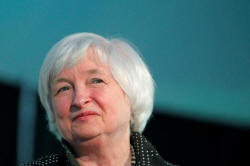|
Fed likely to avoid rate
hike before Britain votes on leaving EU
 Send a link to a friend
Send a link to a friend
 [June 03, 2016]
By Howard Schneider and Ann Saphir [June 03, 2016]
By Howard Schneider and Ann Saphir
WASHINGTON (Reuters) - The U.S. Federal
Reserve may be forced to delay a rate hike at its June meeting
because of mounting concern over the economic fallout from Britain's
vote on whether to leave the European Union.
The geopolitical risk likely will push any rate increase until at
least July, despite apparent consensus among Fed officials that a
hike is warranted by stronger U.S. growth and tight labor markets.
The Fed's June 14-15 rate-setting meeting comes just a week before
the British vote on June 23. A "leave" vote is expected to roil
financial markets, cause credit spreads to widen, trigger a rush
into safe assets and bolster the dollar.
The dollar’s recent stability is one reason the Fed has become more
comfortable with raising rates, and officials may want to let the
threat of Brexit pass before moving to tighten financial conditions.
Fed Board Governor Daniel Tarullo on Thursday joined the chorus of
those warning of his concerns over the British vote, telling
Bloomberg that Brexit would be a "factor" he would consider at the
Fed's June policy meeting and said that the British vote's impact on
markets would be key.
The most recent poll found that voters in Britain - Europe's second
biggest economy and its most influential financial center - were
evenly split on whether to stay in the EU or to leave.

By the time the Fed meets on June 14 and 15, at least four of the
five Washington-based governors will have aired their views on the
outlook for rates, with Lael Brainard due to speak Friday and Chair
Janet Yellen appearing in Philadelphia next week.
Fed officials will release their latest economic projections at the
June meeting along with a policy statement, and Yellen is scheduled
to hold a post-meeting news conference.
The two governors who have addressed the Brexit vote so far have
sounded notes of caution.
"I do see the possibility of a real hit to economic growth both in
the U.K and the EU," Fed Board Governor Jerome Powell said last
week. "I can imagine the upcoming Brexit vote as presenting a factor
in favor of caution about raising rates.”
Secret meetings across Europe reveal uncertainty over what would
follow a vote that British Prime Minister David Cameron calls a
"leap in the dark" - and also concern about what happens if Britain
stays in.
If Britain remains in the EU, it could lead to continued infighting
in the ruling Conservative party and destabilizing battles with the
rest of the EU.
Waiting on the Brexit vote is a "no-brainer," said Jon Faust, a
former Fed staffer and now a professor of economics at Johns Hopkins
University. "Why move now as opposed to a few weeks from now?"
CONSENSUS ON CAUTION
With few exceptions, the message from regional Fed bank presidents
has been consistent: the upcoming Brexit vote may tip the scales
against a June increase.
This is only the latest obstacle to the Fed's two-year struggle to
normalize U.S. monetary policy after dropping rates dramatically
during a protracted downturn.

In 2014, the crash in oil prices and a rapid spike in the value of
the dollar crushed U.S. exports and drove inflation into a ditch.
Last year, a surprise slowdown in China’s economy, alongside the
malaise in Europe and Japan, sparked global market turbulence and
broader concerns about a worldwide recession. That vexing landscape
kept the Fed on hold until December.
[to top of second column] |

Federal Reserve Chair Janet Yellen speaks at the Radcliffe Institute
for Advanced Studies at Harvard University in Cambridge,
Massachusetts, U.S. May 27, 2016. REUTERS/Brian Snyder

Now, Brexit aside, the prospect of a rate hike soon appears all but certain.
Unemployment dropped to 5 percent in April; inflation appears to be gaining
traction as the drag from cheap oil and a strong dollar fades; and the lull in
growth over the past few months has proved temporary, with consumer spending and
the housing market showing particular strength.
The probability of a June rate increase is now about 17 percent, according to
Fed funds futures trading data compiled by the CME Group, compared to 57 percent
for July.
While the impact of a vote to leave the EU is uncertain, one widely expected and
immediate result is likely to be a jump in the value of the dollar - a further
blow to U.S. exporters and another drag on inflation that the Fed still
considers too low.
JULY OVER JUNE
If the Fed does indeed take a pass at its June meeting, officials have signaled
they’ll be ready to move in July.
Minutes of the Fed’s March policy meeting showed officials preparing the ground
for higher rates sometime in the summer months. After July, the next option
would be September, in the middle of a U.S. election campaign, in which the Fed
and Yellen could well become targets of debate.
Four of the Federal Reserve’s 12 regional bank presidents have asked to raise
the interest rate charged to commercial banks for short-term loans - a proxy for
saying the target rate should move higher.

If the board defers a rate hike at its June meeting, Yellen will face a
rhetorical challenge in explaining why global factors are again trumping
domestic economic data - when Fed officials have tried to convince the public
that their decisions are "data dependent."
One approach she could take, economists said, is to flag the Fed officials'
agreement in favor of gradual rate rises over the next couple of years, but to
emphasize that low inflation means there is no urgent need to start raising
rates right away, especially ahead of such a one-time and potentially critical
world event.
"Even if Brexit were seen to be an unlikely outcome, we think this extremely
cautious Fed Chair might see relatively little cost to waiting another seven
weeks to act," RBS economists Michelle Girard and Kevin Cummins said in a note.
(Reporting by Howard Schneider and Ann Saphir, additional reporting by Jason
Lange)
[© 2016 Thomson Reuters. All rights
reserved.] Copyright 2016 Reuters. All rights reserved. This material may not be published,
broadcast, rewritten or redistributed. |